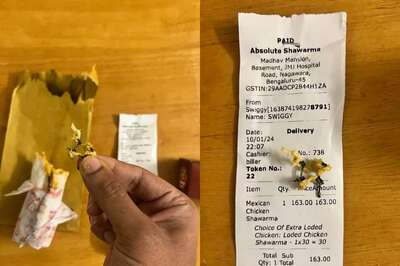
views
- Read books by reputable authors like Scott Cunningham or Phyllis Curott to get a feel for the history and modern practice of witchcraft and magic.
- Get clear on why you want to study witchcraft to hone your energy and focus. Is it to develop your individual spirituality? To connect with nature?
- Practice your craft daily and seek advice and wisdom from other witches in-person or online through message boards or social media.
Gathering Information & Supplies

Research different types of witchcraft to see what resonates with you. There are as many different ways to practice magic as there are witches, and finding rituals and beliefs that feel natural to you will help you hone your craft on your own personal journey. Don’t feel pressured to stick to only one type of witchcraft—eclectic witches, for example, use techniques from all types of practices to suit their current needs. Other types of witches include (but are by no means limited to): Coven-based witches: Witches who practice magic and rituals together to perform stronger spells than they could alone. Witches who work alone are called solitary witches. Crystal witches: Witches who use crystals, gems, rocks, and stones to manifest and direct energy. Cosmic witches: Witches that study astrology, astronomy, and the cycles of the Moon to influence energy. Green witches: Witches who draw their power from the Earth and outdoors for healing or nurturing magic. Plant witches are similar and use plants and herbs to concoct spells and potions. Hedge witches: These witches are similar to green witches, but craft their own individual, minimalist style of magic centered around nature and healing. Gray witches: These witches use both light and dark magic to suit their circumstances (most witches do not touch dark magic at all). Generally, they use dark spells to redirect negative energy and correct injustices rather than hexing anyone they wish. House, hearth, or kitchen witches: These practitioners use magic in the home, like cooking magic or ritual cleaning magic. Sea witches: These witches are drawn to the ocean and may use seawater or seashells in their rituals. They also observe the Moon closely for its effects on the tides.

Gather some basic magical supplies to prepare for your first spells. There are no hard rules about what you need to study witchcraft, and almost any spell or ritual can be completed without materials or objects as long as your intention is clear and you’re focused on your goal. However, having some ritual objects on hand can help focus your energy and improve your results. Some starter supplies for beginners might include: Ritual knives, such as an anthame (a ceremonial knife that symbolizes fire and directs your energy) or a boline (a small knife used to chop ritual herbs and spices). A book of shadows, or a ritual journal where you can record your observations, feelings, and spells. Use any journal you like, or purchase one with guides and prompts to help you get started. Natural candles with short burn times in a variety of colors. Also grab a fireproof bowl to practice candle or burning rituals safely. Crystals to focus your spellwork and visualization and to bring good energy into your home. Divination tools such as tarot cards, rune stones, or a scrying bowl. Magical herbs, smudge sticks, and essential oils like sugar, sage, jasmine, cinnamon, lavender, rose, peppermint, eucalyptus, or rosemary. Salt is very common and can purify your working space.

Separate witchcraft from the religions of Wicca and Neo-Paganism. Strictly speaking, witchcraft or magic is the ability to influence the world through occult (hidden or unseen) means, such as supernatural or spiritual forces. Anybody can practice or perform witchcraft without belonging to a specific group, religion, or culture, although these associations can influence the type of witchcraft you practice. Wicca is a Neo-Pagan religion founded in the 20th century in Britain (some consider it the religion of pre-Christian Europe, but this is not historically accurate). Many practitioners refer to themselves as witches, but not all witches are Wiccans. Wiccans value the divine feminine, nature, and using magic for good or constructive purposes. Wicca can be practiced alone or in groups called covens. Neo-Paganism is a modern movement or family of religions based on pre-Christian religions from Europe, North Africa, and West Asia. The religions vary widely, but are typically based on ritual practices and celebrations of nature, like solstice festivals or acknowledging the changing of the seasons. Magic and witchcraft may be a part of some Neo-Pagan practices, but is not a requirement.

Read books by experienced authors to learn about the history of witchcraft. There are a variety of books and literature out there for every experience level, including beginners. Spend some time reading to understand why and how people choose to practice witchcraft, their relationship with their practice, and how it can affect your life. Some excellent books for first-timers include: Wicca: A Guide for the Solitary Practitioner by Scott Cunningham Power of the Witch: The Earth, the Moon, and the Magical Path to Enlightenment by Laurie Cabot Dark Side of the Moon: A Complete Course in Magic & Witchcraft by Basil E. Crouch Your Book of Shadows: How to Write Your Own Magickal Spells by Patricia Telesco Witch Crafting: A Spiritual Guide to Making Magic by Phyllis Curott A Witches’ Bible: The Complete Witches’ Handbook by Janet and Stewart Farrar Check out the bibliographies of these books to find ideas for further reading.
Cultivating Your Practice

Get clear on why you want to learn more about witchcraft. Grab a journal (or your book of shadows, if you’ve got one) and handwrite a few reasons that witchcraft interests you. Remember, there’s no “right” reason to study magic, and everyone’s journey is personal and unique. Today, many people are practicing Wicca and/or witchcraft to find their own individualistic spirituality, deepen their connection to the Earth and nature, or to enhance mindfulness and the mind-body connection. Other appealing aspects of witchcraft include an emphasis on equality and diversity, feminism and the concept of divine feminine energy, and environmentalism. Keep in mind that modern witches frown upon using magic for manipulation, revenge, or other dark purposes. There are few “rules” around using magic, but the Wiccan religion does abide by the norm “Harm none and do as you will.”

Have realistic expectations and challenge your preconceptions. Real-life witchcraft doesn’t work like it does in the movies—spells won't usually just happen instantly after saying a few magic words and following a step-by-step ritual. Instead, think of witchcraft as a way to channel your energy and innate power to cope with life’s hurdles and achieve your goals. Results don’t happen overnight and there’s no strict instruction manual to aid you, so be patient and follow your intuition to find the practice that works for you. Also remember that witchcraft is not a replacement for things like medication, therapy, or communicating your feelings to others. Think of it as an assistant or a tool to help you rather than a one-stop-shop to solve your problems right away. Keep in mind that the effects of your spells may not be exactly what you wanted, too. For example, you might cast a spell to make yourself more popular at school only to end up disliking your new crowd of friends.

Read about or meditate on your witchcraft every day. Spend some time each day reflecting on your practice or journaling in your book of shadows—what works for you and what doesn’t? How do you feel when researching or performing magic? What do you hope to accomplish? Dedicate a portion of your reflecting time to visualizing your goals and intentions. Visualization, or the ability to see and feel the results of your spells before they happen, is key in many branches of witchcraft. If you struggle with visualization, try imagining your success through your other senses. For example, if you’re performing a love ritual, you might focus on “hearing” your true love’s voice rather than picturing what they look like.

Practice your witchcraft and spellcasting regularly. Don’t be afraid to try out what you learn—like other skills, practice and dedication make perfect! Once you’ve got a clear idea of what what you hope to accomplish, try casting a simple spell or performing a ritual. Choose something straightforward and low-stakes to begin with, like casting a spell for good luck or performing a protection ritual to block negative energy. Journal in your book of shadows after each spell. Record what you said or did in detail, plus your thoughts, feelings, intentions, and results, to guide your progress and refer to later. Until you’re comfortable in your practice, steer clear of negative spells and rituals that could harm someone (or yourself) if performed incorrectly, like a love spell or hex. In the worst cases, most spells can be reversed or redirected (although if you’re just starting, you may want to recruit a more experienced witch to help you).

Seek out online communities that can help you in your study. Although in-person covens are growing in popularity, there are a number of online resources to check out to help you network, connect with, and learn from other witches. Look for witchcraft podcasts, message boards, blogs, and reading lists to learn how other witches practice their craft. If you’re on social media, try searching the hashtags #WitchesOfInstagram on Instagram or #WitchTok on TikTok to find tips and posts from other practitioners. Ask other witches for their opinions and strategies, but don't be surprised if they differ from yours. Remember, there are infinite ways to study witchcraft!

Remember to have fun and do only what feels right to you. Witchcraft is meant to enhance your life, not to make you anxious. If you’re uncomfortable with a spell, ritual, coven, or even an ingredient for a potion, look for an alternative or trust your own instincts to do what’s right for you. Plus, the more comfortable and connected you feel to what you’re doing, the more successful you will be! Stay safe and research any ingredients you use in rituals or potions. Some may have side effects that aren't commonly known. Do not join any covens that seem strange or that give you a “bad vibe.” Also, do not accept training from anyone who feels “off” to you. Instead, seek witches or teachers who have a history of providing safe, personalized instruction (online reviews are a great place to look).




















Comments
0 comment